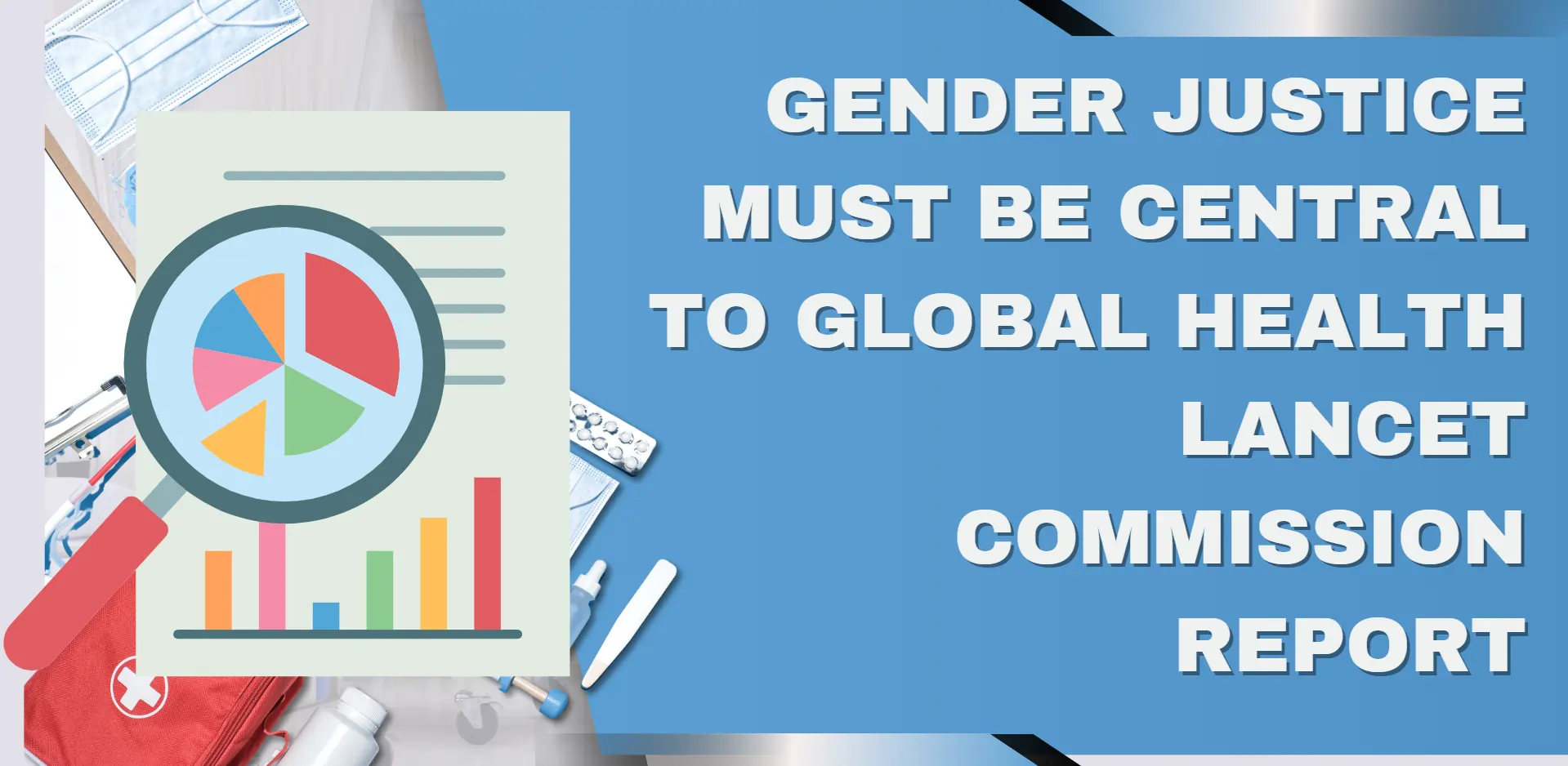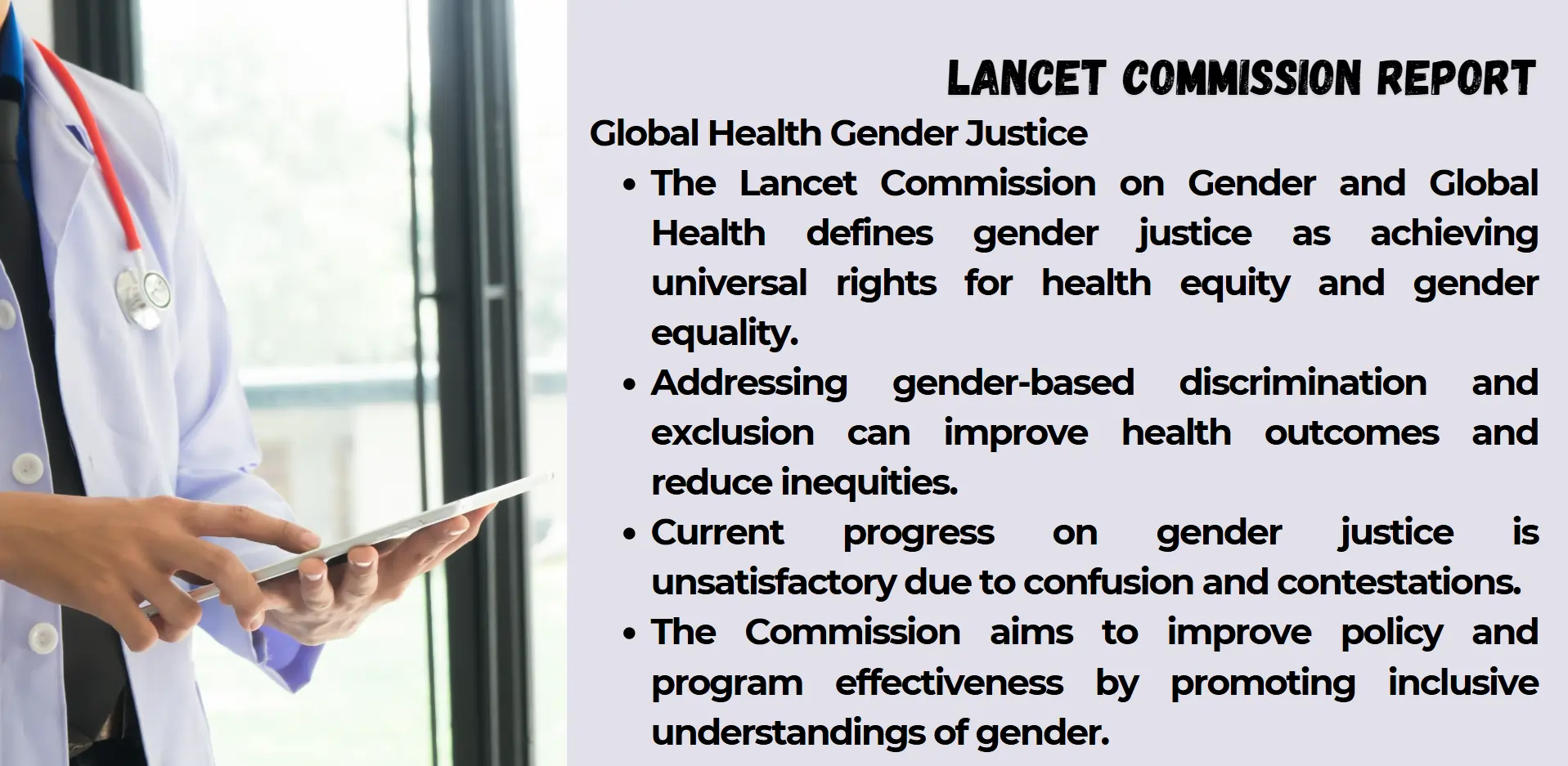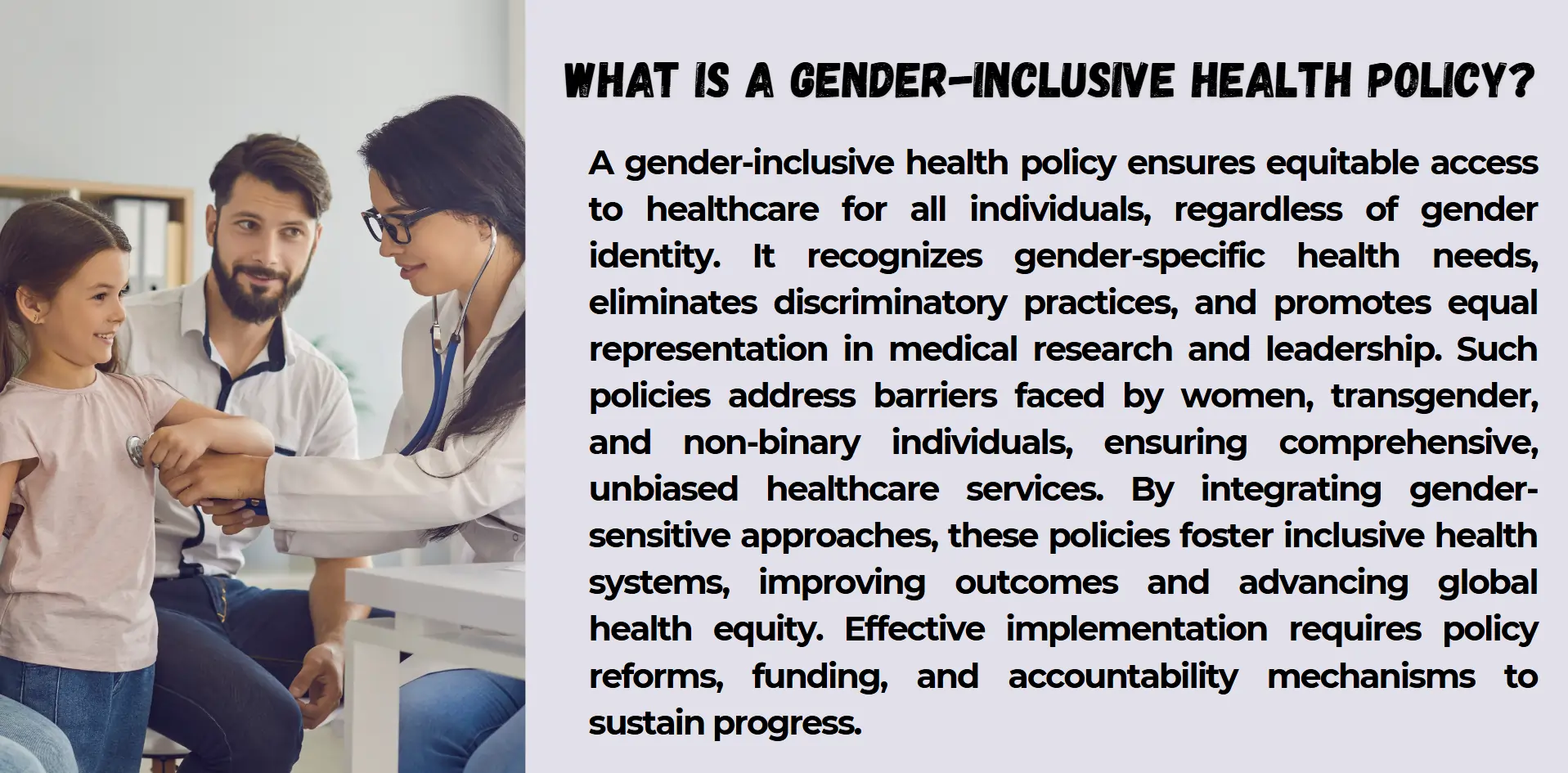The article examines how the Lancet Commission demands gender justice in worldwide health but it analyses discrimination patterns along with structural obstacles combined with necessary policy amendments to achieve equal healthcare delivery by 2030.

Health systems worldwide show persistent inequities which exclude gender justice from their policy development and healthcare service delivery protocols. The Lancet Commission on Gender and Global Health proves the importance of gender-inclusive health systems because these systems would enable better overall health outcomes. Structural barriers alongside discriminatory practices affect women and marginalized genders in particular who face reduced access to satisfactory medical care and health leadership roles. The commission maintains that destructive gender norms receive exploitation by political and commercial entities which create obstacles to required reforms. Health institutions will need to take drastic forward-looking changes towards implementing gender-focused strategies to deliver equitable healthcare access by 2030. This article examines how the Commission discovered its findings together with its encountered obstacles and suggested solutions while demanding structural modifications to global health administration. Health systems fail to improve disparities unless they prioritize gender justice throughout their framework.
Global health’s understanding of gender justice
Health systems that operate at the global scale neglect gender equalities which results in differences between women and men in healthcare access. The purpose of gender justice in health functions to fix these inequalities through healthcare policies that keep services inclusive and equitable for men and women. The analysis accepts differences between sexes along with social roles that impact healthcare yet requires system modifications to create real equality.
Defining Gender Justice in Health
Gender justice represents a system that distributes all forms of health resources as well as healthcare opportunities and treatment with equality towards all genders inclusive. This approach fights against discriminatory rules while it targets the basic reasons behind healthcare inequality. The method delivers healthcare services in a manner that treats people equally without any form of discrimination regardless of their gender identity.
Gender-Based Health Disparities
The effects of gender on health status extend throughout the entire world. Women together with marginalized gender groups encounter several obstacles to receive healthcare while suffering from elevated maternal mortality rates and insufficient representation during medical examination research. Human societies through cultural expectations and social norms block people from getting healthcare which they need.
The Role of Social Determinants in Gender Inequality
Specific social factors including education status and employability together with economic conditions determine what forms health inequalities. Stable economic circumstances remain out of reach for many women alongside gender minorities making it tougher for them to acquire healthcare access. Education deficiencies pertaining to reproductive rights and health conditions make previously avoidable health emergencies more common among diverse communities.
Systemic Barriers to Gender Justice in Health
Healthcare institutions typically sustain the gender discrimination already in place. Inadequate budgetary resources and discriminatory policies along with social prejudices block access to gender-specific healthcare services for patients. Medical research with gender biases produces limited treatment effectiveness that results in both incorrect medical diagnoses and discriminatory health policies.
The Impact of Policy and Governance
Policy leaders have the essential role to advance gender justice. Improvements in healthcare accessibility occur when policymakers use gender-sensitive policies to fund initiatives that support women's health needs. A diverse leadership based on women and marginalized genders supports global health strategies because these groups bring their unique perspectives to governance decisions.
Towards an Equitable Future
Gender justice in global health requires all stakeholders to perform structural reform alongside both legislative changes and direct community collaboration. The health sector needs partnership between medical staff, government leaders and international institutions to build healthcare systems that respect all genders. The elimination of structural inequalities will turn gender justice into the essential foundation of global health thus working to build an equitable society.
Findings of the Lancet Commission Report
The Lancet Commission on Gender and Global Health emphasizes the immediate requirement to achieve gender justice in every global healthcare system. Health results together with medical care accessibility and medical organization leadership positions experience negative distortions from gender inequality according to the report findings.

Gender Disparities in Healthcare Access
According to the report women alongside marginalized gender groups encounter numerous obstacles when trying to gain access to healthcare systems. Several socio-economic elements along with cultural norms together with institutional prejudices generate unfair treatment. The absence of gender-sensitive healthcare approaches in many medical institutions creates better outcomes for disadvantaged population groups.
Underrepresentation in Medical Leadership
Women are still underrepresented in leadership positions. According to the study women constitute fewer than 30% of senior health leaders in management positions. The absence of proper representation causes negative impacts on healthcare policies as well as research planning and financial resource distribution patterns.
Influence of Commercial and Political Interests
According to The Lancet Commission commercial interests and political movements frequently amend health policies by using dangerous gender norms as a tool. Profit-maximization by pharmaceutical companies, private healthcare providers and political groups slows down essential changes in gender-inclusive healthcare reform.
Systemic Barriers to Gender Justice
The research document exposes operational obstacles that medical facilities construct which block equality for both genders. Systemic barriers exist due to insufficient financial support of gender research as well as insufficient oversight methods and opposition to policy transformations. Systemic problems that remain untreated will keep gender inequalities from disappearing.
Recommendations for Transformative Change
In addition to methods supported by evidence, by 2030, gender justice should be a reality, according to the Commission. These consist of:
- At least two important steps forward include adding gender-responsive policies to healthcare structures.
- Medical leaders should establish equal participation in their ranks.
- The Lancet Commission supports commercial actor responsibility for health inequities between genders.
- Gender-focused research investments should be prioritized because they will enhance health results.
The Lancet Commission Report functions as an urgent directive for global health organizations together with health professionals and policymakers. Implementing structural and system-wide reforms has become essential to stop gender disparities from stalling global health progress. Equitable healthcare systems depend on implementing Commission recommendations because they establish healthcare systems which value gender justice.
Challenges to Achieving Gender Justice in Global Health
Collaborating for gender justice within global health encounters multifaceted obstacles which stem from entrenched infrastructure obstacles and political hurdles. The Lancet Commission on Gender and Global Health identifies multiple factors which block the development of fair healthcare institutions.
Lack of Gender-Inclusive Policies
Healthcare organizations consistently fail to adopt gender-sensitive policies thus creating unequal opportunities for medical care as well as healthcare research services. The needs of women and gender minorities along with marginalized communities fail to receive attention from policy officials who thus maintain inequalities in healthcare services.
Underrepresentation in Leadership
Women together with gender minorities suffer from significant underrepresentation during global health leadership positions. The healthcare workforce is predominantly female but senior leadership roles heavily favour males since they represent only approximately 30% of such positions. Empty representation at leadership tables causes modifications to decisions along with distribution changes in spending resources.
Influence of Anti-Gender Movements
Health policies face negative consequences because of increasing anti-gender rhetoric together with gender issue politicization. Some political leaders alongside commercial interests weaponize gender discrimination to prolong essential reform processes while obstructing financial support for gender-based healthcare programs.
Systemic Barriers in Healthcare Institutions
Healthcare institutions fail to establish proper measures which would maintain gender justice across their systems. Persistent gender-based disparities stem from insufficient funding of gender-specific research as well as medical education biases and the opposition to policy modifications.
Socioeconomic and Cultural Constraints
The cultural traditions and financial barriers that exist create unfavourable conditions which prevent women and groups with marginalized genders from obtaining good healthcare services. Many locations throughout the world enforce gender-based discrimination which prevents people from receiving medical treatment and taking part in health leadership roles.
Evidence-based strategic action combined with structural changes remains necessary to overcome these difficulties. System-wide changes are necessary to stop gender disparities from restricting global health progress. Inclusive policies together with leadership reform must take priority because they provide a path to deliver gender justice by 2030.
Recommendations by Commission
Strong evidence-based solutions to address gender inequality in healthcare delivery systems are provided by the Commission on Gender and Global Health. The recommended strategies aim to develop fair health care systems that support people of all genders by the target year 2030.

Integrating Gender-Responsive Policies
Such policies require special attention because they need to accommodate health needs which differ for women along with gender minorities. Government institutions need to guarantee that their healthcare programs provide equal availability of reproductive health care alongside maternal services as well as treatments specific to gender requirements.
Ensuring Equal Representation in Leadership
The report demands enhanced female and gender minority representation across global health leadership positions in order to destroy existing structural impediments. Organizations that include more diverse personnel in their leadership roles create greater policy inclusiveness alongside equitable resource distribution outcomes.
Holding Commercial Actors Accountable
The advisory body underlines the way commercial interests negatively affect the formulation of health policies. Medical companies along with private health organizations need to receive consequences for their roles in perpetuating gender differences in health. Healthcare policy based on clear legal frameworks and moral standards forms an essential defence against harmful practices.
Investing in Gender-Focused Research
The absence of gender-specific medical research causes diagnostic and therapeutic differences to emerge between genders. The Commission demands national and institutional support for gender-focused research funding because this creates medical solutions that understand biological and social differences between genders.
Strengthening Accountability Mechanisms
Implementation of accountable systems through healthcare organizations constitutes one recommendation to establish gender justice. Regular audits combined with transparent reporting as well as policy evaluation procedures ensure that organizations remain compliant with gender-inclusive strategies and demonstrate their progress accurately.
Addressing Socioeconomic Barriers
Economic differences stop marginalized people from receiving healthcare services. The Commission endorses health care affordability measures as well as financial programs and community-based healthcare solutions to reduce income disparities.
The Lancet Commission has developed important guidelines that show the way to realize gender equality within global healthcare systems. These solutions need joint action between governmental bodies’ healthcare facilities and rights advocacy organizations in order to become operational. Gender equality obstacles remain in operation unless governments introduce fundamental healthcare system changes.
The Future of Gender Justice in Global Health
A sustained effort toward systemic inequality dismantling is what global health requires achieving gender justice. Gender justice as a future practice requires policymakers to resolve inequalities through diverse leadership and universal access to healthcare systems.
Strengthening Gender-Inclusive Policies
Health institutions and governments need to establish gender-responsive policies that will resolve health care differences regarding service access and treatment along with research symmetry. Medical leadership positions need equal gender representation within established policies which should also include gender-sensitive healthcare delivery.
Advancing Gender-Focused Research
The healthcare outcomes will improve because of investments made in gender-specific medical research. Healthcare systems of the future should develop data-based solutions which factor in biological along with social factors affecting treatment outcomes and diagnostic results.
Addressing Socioeconomic Barriers
The financial disparities between groups work as barriers that keep marginalized communities from receiving healthcare services. A solution-focused strategy for the future needs to develop cost-effective healthcare approaches together with public financial support and evidence-based community intervention programs to minimize existing gaps.
Conclusion
Financial change based on gender requires immediate implementation because it creates a moral framework and essential operational structure for optimal healthcare delivery. According to the Lancet Commission report widespread discriminatory systems resist progress while demanding substantial reform at multiple levels. A healthcare system serving all patients fairly will result from implementing gender-responsive policies while increasing leadership representation and establishing commercial actor accountability. Successful global health progress relies on the unification of policymakers with medical institutions together with advocacy groups. Social fairness together with improved health outcomes follows the promotion of gender justice principles.